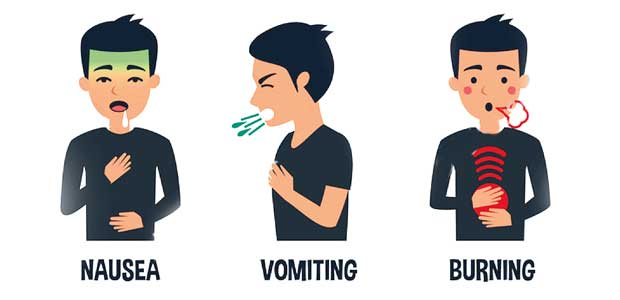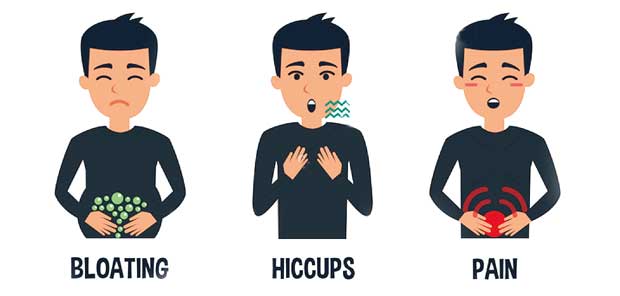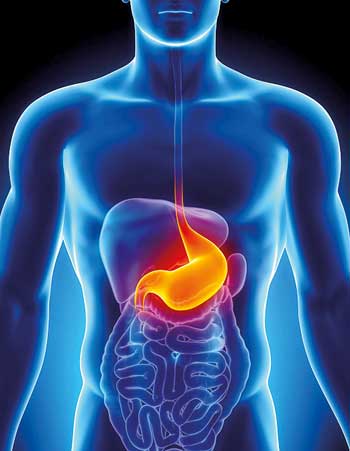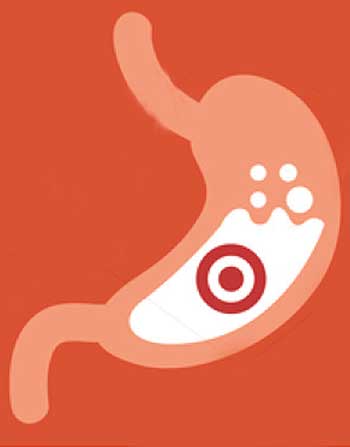12 Jul 2017 - {{hitsCtrl.values.hits}}

 Burning sensation in your tummy? Nauseous? Loss of appetite? Well, stakes are high on the fact that you are suffering from gastritis. Our health takes a back seat in our race against time to keep up with the busy schedules that dictate over us every day. Gastritis is quite a trending condition with so many people falling victim to it, sometimes without a hint of warning. So if you haven’t fallen victim yet, you are most likely to be next. So it is quite essential to be aware and take necessary steps to prevent from falling into the clutches of this fiery menace we call gastritis. To do this, clear comprehension of this medical complication is necessary.Speaking to the Health Capsule, Dr. Prasad Siriwardana, Consultant Physician of the District General Hospital, Ampara, provides answers to the common public demanding questions that revolve around gastritis.
Burning sensation in your tummy? Nauseous? Loss of appetite? Well, stakes are high on the fact that you are suffering from gastritis. Our health takes a back seat in our race against time to keep up with the busy schedules that dictate over us every day. Gastritis is quite a trending condition with so many people falling victim to it, sometimes without a hint of warning. So if you haven’t fallen victim yet, you are most likely to be next. So it is quite essential to be aware and take necessary steps to prevent from falling into the clutches of this fiery menace we call gastritis. To do this, clear comprehension of this medical complication is necessary.Speaking to the Health Capsule, Dr. Prasad Siriwardana, Consultant Physician of the District General Hospital, Ampara, provides answers to the common public demanding questions that revolve around gastritis.
Definition
Gastritis is the inflammation of the inner lining of the stomach which is known as the mucous membrane. “Some people have gastritis that comes on suddenly and lasts only for a short time. Doctors call this ‘acute’ gastritis. Other people have gastritis that lasts for months or years. Doctors call this ‘chronic’ gastritis.”
The most common telltale sign of gastritis is the burning sensation that flares up in the stomach when in hunger and even after having meals

Causes
It was of common belief that not taking your meals on time was one of the main reasons to get gastritis. But that bubble has burst with research proving this forever standing perception to be untrue. However, irregular intake of meals can aggravate the condition of gastritis once it is contracted.
According to Dr. Siriwardana, certain types of drugs known as anti-inflammatory drugs are known to cause gastritis. “Medicines called ‘non-steroidal anti-inflammatory drugs’ (NSAIDs) can cause gastritis. These include aspirin and ibuprofen. These drugs are used as painkillers in the medication for joint ache.” Steroids too cause gastritis by inhibiting the action of prostaglandins in the body and thereby reducing the thickness of the mucous membrane making it more vulnerable to injury.They also increase the secretion of gastric juice in the stomach.

Regular consumption of oily and spicy food can also cause gastritis as these types of food stimulate the acid secretary cells in the stomach. Dr. Siriwardana also mentioned that new developments have revealed that gastritis can also occur as a result of a food allergy.
Another major and common reason for gastritis is due to the infection of the bacteria Helicobacter pylori residing in the region of the stomach known as the antrum. These bacteria attack the protective lining of the stomach.Their mode of transmission is orally through contaminated food.
Mental stress, heavy alcohol consumption, conditions in which the body’s infection-fighting system attacks the stomach lining and having a serious or life-threatening illness are some other causes that erupt gastritis into your system. “The condition known as bile reflux is known to cause chronic gastritis which is a serious issue. Bile reflux is a medical complication where the backflow of bile takes place into the stomach from the bile tract. This condition demands for immediate professional treatment by a physician.”
Neglected gastritis left untreated could develop to a worse state leading to the formation of gastric ulcers
How can I tell if I am a patient?
Patients with gastritis have no symptoms. When people do display symptoms they are usually due to other disease conditions like ulcers. Dr. Siriwardana stated some of the signs that are generally observed in patients with ulcers. “The most common telltale sign of gastritis is the burning sensation that flares up in the stomach when in hunger and even after having meals. Bloating of the stomach after eating a small amount of food, decreased appetite, nausea or vomiting, vomiting blood, feeling more tired than usual (This happens if people with gastritis get a condition called ‘anemia.’) are some of the symptoms of gastritis.”
How it’s diagnosed
When it comes to clinical diagnosis, physicians arrive at a conclusion by speaking to the patients on the symptoms that they have been experiencing and recommend appropriate medication after conducting examinations. “Patients are advised to seek medical help when they have a belly pain that gets worse or doesn’t go away, vomit blood or lose weight without trying to.” Several tests are performed to diagnose gastritis. Dr. Siriwardana explained that in certain cases an upper endoscopy test will be recommended. “In an upper endoscopic test, a thin tube containing a tiny camera will be inserted through the patient’s mouth down into the stomach where the stomach lining will be viewed. A tiny sample of tissue may also be removed from the stomach lining (known as biopsy) and analyzed. Tests to check for H. pylori infection include blood tests, breath tests, tests on a small sample of your bowel movement, and a barium swallow. Blood tests are also conducted to check for anemia.”

Is complete cure possible?
Gastritis can be cured. If contraction of gastritis is found to be caused due to anti-inflammatory drugs, doctors prescribe alternative drugs that wouldn’t induce gastritis or doctors might prescribe supplementary medicine along with the anti-inflammatory drugs to suppress gastritis. Doctors can use medicines that reduce or block stomach acid to treat other causes of gastritis. The main types of medicines that reduce or block stomach acid are antacid agents, histamine blockers and proton pump inhibitors. Patients are also asked to reduce oily and spicy foods. If the bacteria Helicobacter pylori is the reason for gastritis, patients are given special antibiotics to cure the condition.
However, Dr. Siriwardana stressed that gastritis, caused due to bacteria, is very common. Sometimes such cases aren’t cured 100% as a patient can get reinfected quite easily. “Sometimes, people who are treated for an H. pylori infection need follow-up tests to make sure the infection is healed. Follow-up tests include breath tests, lab tests on a sample of bowel movement, or endoscopy.” To prevent the aggravation of gastritis further, regular partaking of meals is also advised so it is vital to adhere to regularized food habits. Alcohol consumers will be asked to avoid alcohol intake.
How to not be a victim
Following healthy and hygienic food habits is the main step towards avoiding crossing paths with gastritis. Reducing the intake of oily and spicy foods is a must. Preparing and consuming food under hygienic conditions is important as well. Regardless of speculations, it’s a healthy habit to take meals on time, making it a regular practice. Saying ‘no’ to alcohol and keeping your mental health intact without being overcome with stress are definite pointers to keep in mind. Yoga and meditation are strongly advised practices in maintaining a calm composure, free of stress.
Is it fatal?
Dr. Siriwardana mentioned that gastritis is not fatal. But neglected gastritis left untreated could develop to a worse state leading to the formation of gastric ulcers. “Gastric ulcers can be fatal as they cause severe loss of blood, so it is advised to get treatment without delay to prevent this condition.”
How common is it?
According to the physician, gastritis is quite common.“About 60-70% of the population suffer from this disease condition. There is no particular age group which highlights more victims. Gastritis is easily contracted by anyone and everyone from all ages, young and old alike. However, the elderly who are above the age of 60 years show more vulnerability to the disease due to weakened resistance with age.” The tendency towards the elderly to contract more diseases is high and use of certain drugs could cause the arousal of gastritis in them.
23 Dec 2024 9 hours ago
23 Dec 2024 23 Dec 2024
23 Dec 2024 23 Dec 2024
23 Dec 2024 23 Dec 2024